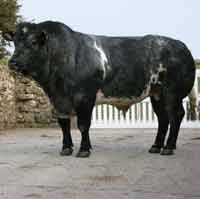Crossbred bulls pay dividends

A cross-breeding programme under way on a Lancashire hill farm is proving the value of using hybrid beef bulls in suckler herds.
As Simon Duerden continues to assess combinations of British Blue, Limousin and now Parthenais genetics, he’s closely monitoring the end result in the finished cattle he is supplying direct to butchers’ shops.
The use of crossbred bulls as terminal sires is losing its stigma, believes Mr Duerden. “It’s no longer seen as a cheap alternative to buying a pedigree bull. More finishers are considering using crossbreds and some of the highest-priced store cattle and suckler cow and calf outfits sold in the region this spring have been sired by hybrid sires.”
Mr Duerden runs Mountain Farm close to Pendle Hill in east Lancashire. The farm carries 70 sucklers alongside Mule and Texel x Mules put to Texel and Charollais rams. All cattle and sheep are finished and sold direct to local butchers.
Suckler cows at Mountain Farm include British Blue x Friesian, Limousin x Friesian, three-quarter-bred Limousin as well as purebred Limousin and Parthenais. While some may consider this range of breeds and crosses as being too diverse – particularly when put to bulls combining a further “mix” of breeds – this is a beef programme run on specific selection where hybridisation is skillfully used to exploit the positive traits of each breed.
Reaping the benefits of producing multi-cross finished cattle by using crossbred bulls is not new here. More than 25 years ago Mr Duerden crossed pedigree Limousin cows with the successful white-coated British Blue bull Gavroche. The male calves were left entire and the best retained to use on the farm and meet demand from the family’s bull hire business.
“The progeny of those first-cross bulls impressed us with their conformation and growth. We followed them through to slaughter and were confident enough to look more closely at the potential of hybrid bulls,” says Mr Duerden.
Foot-and-mouth in 2001 brought the ongoing assessment of crossbred sires to an abrupt end, but pedigree Limousin cows bought for re-stocking – as well as a small herd of Parthenais cattle – heralded the start of a new era of hybrids at Mountain Farm.
“I’m convinced the Parthenais has a lot to offer. The best suckled calf I’ve ever seen was a three-quarter-bred Parthenais. It took my breath away and made me realise what this breed is capable of.”
Mr Duerden says the Parthenais has light bone and is well muscled. But it’s also easy calving and produces exceptionally high-quality beef. “Parthenais beef may look extremely lean, but it eats with great flavour and succulence. And the Parthenais influence certainly improves the killing-out percentage. We can get up to 67% on some carcasses.”
Purebred British Blue and Limousin bulls are also used by Mr Duerden and his enthusiasm for using crossbred sires in no way seeks to undermine the value of pedigree sires. But in a business that involves every aspect of the beef chain – from breeding, finishing, slaughter and selling to butchers – he’s convinced hybrid bulls have a role.
“Farmers always ask why they should use a crossbred bull. It’s got to be a crossbred bull that has been bred specifically for the job from carefully selected parentage and not a chance-bred sire with no breeding behind it.
“We know what our bulls can produce in terms of carcass quality. From a producer’s point of view they are consistently giving easier calving and exceptionally vigorous calves. We’re only just starting to see what the Parthenais can do, but we’re convinced it will take our hybrids on to the next level.”
Selling direct to local butchers makes this business acutely aware of the financial advantages of producing top-quality beef cattle with a high killing-out percentage.
“But the challenge all producers face is achieving cattle with superior shape without calving problems. A concentration of extreme conformation traits will deliver a high-value carcass, but no one wants to risk losing calves as a result.
“Our crossbred bulls are producing the quality of cattle our butcher customers demand without the high risk of calving problems even though we’re working with British Blue and Limousin-cross cows.”
CASE STUDY: Martin Lee, Sabden Fold, Burnley Being able to get a “double dose” of British Blue breeding into suckled calves without the risk of calving problems – that’s what’s driven Lancashire hill farmer Martin Lee to use two homebred British Blue x Limousin bulls in his herd of 140 sucklers at Sabden Fold, Burnley.
A 10-strong batch of 11-month-old bulls bred out of British Blue-cross cows and by crossbred sires recently caused a stir at Skipton Auction Mart, North Yorkshire. They averaged £830 and topped at £950.
“Any cow with British Blue breeding in it goes to the crossbred bull. We used to put Blue suckler cows bred out of Friesians to pure Limousin bulls. But we had far too many calving problems with the male calves and the heifers didn’t feed well for us.
“Putting them to the crossbred bulls is giving us calves of tremendous conformation without the calving problems we’d get if we used purebreds.”
